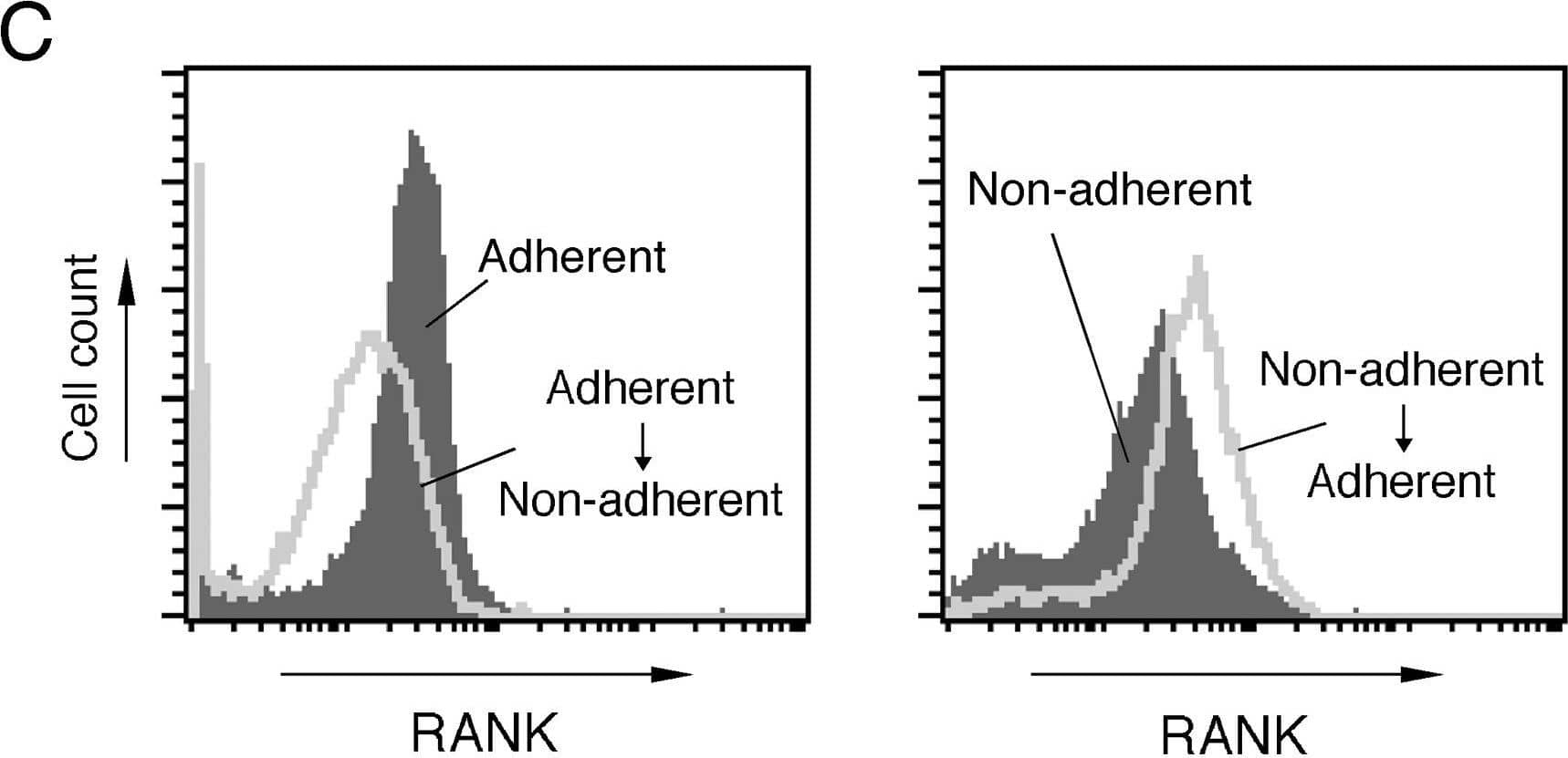Mouse RANK/TNFRSF11A Biotinylated Antibody
R&D Systems, part of Bio-Techne | Catalog # BAF692


Key Product Details
Species Reactivity
Validated:
Cited:
Applications
Validated:
Cited:
Label
Antibody Source
Product Specifications
Immunogen
Gln30-Pro213
Accession # O35305
Specificity
Clonality
Host
Isotype
Scientific Data Images for Mouse RANK/TNFRSF11A Biotinylated Antibody
Detection of RANK/TNFRSF11A by Flow Cytometry
RANK expression levels under adherent and non-adherent conditions.A. BMMs under the adherent condition were harvested (0 h) and subsequently cultured again under adherent and non-adherent conditions in the presence or absence of M-CSF (50 ng/ml), TGF-beta (1 ng/ml), and RANKL (150 ng/ml) for the indicated periods. Relative expression levels of RANK mRNA were determined by real time RT-PCR. Data represent mean values of three independent experiments, with error bars indicating ± SD. **PApplications for Mouse RANK/TNFRSF11A Biotinylated Antibody
Western Blot
Sample: Recombinant Mouse RANK/TNFRSF11A Fc Chimera (Catalog # 692-RK)
Formulation, Preparation, and Storage
Purification
Reconstitution
Formulation
Shipping
Stability & Storage
- 12 months from date of receipt, -20 to -70 °C as supplied.
- 1 month, 2 to 8 °C under sterile conditions after reconstitution.
- 6 months, -20 to -70 °C under sterile conditions after reconstitution.
Background: RANK/TNFRSF11A
RANK (receptor activator of NF-kappa B, also known as TRANCE receptor, osteoclast differentiation factor receptor [ODFR] and TNFRSF11A) is a member of the tumor necrosis factor receptor family. The full length mouse RANK cDNA encodes a type I transmembrane protein of 625 amino acids (aa) with a predicted 184 aa extracellular domain and a 391 aa cytoplasmic domain. The extracellular domain contains two potential N-linked glycosylation sites. RANK shares significant amino acid homology with other members of the TNF R family in its extracellular four cysteine-rich repeats. Human and murine RANK share 81% aa identity in their extracellular domains. RANK is widely expressed with the highest levels in skeletal muscle, thymus, liver, colon, small intestine and adrenal gland. RANK is expressed in dendritic cells. In activated human peripheral blood T lymphocytes, RANK expression is induced by IL-4 and TGF-beta. Multiple tumor necrosis factor receptor-associated factors (TRAFs) are involved in the signaling of RANK. TRANCE (TNF-related activation-induced cytokines, also known as RANK ligand [RANKL], osteoprotegerin ligand [OPGL], and osteoclast differentiation factor [ODF]) is the ligand for RANK. The biological functions mediated through RANK include activation of NF-kappa B and c-jun N-terminal kinase, enhancement of T cell growth and dendritic cell function, induction of osteoclastogenesis, and lymph node organogenesis. Soluble RANK is able to block TRANCE induced biological activity.
References
- Anderson, D.M. et al. (1997) Nature 390:175.
- Nakagawa, N. et al. (1998) Biochem. Biophys. Res. Commun. 245:382.
Long Name
Alternate Names
Gene Symbol
UniProt
Additional RANK/TNFRSF11A Products
Product Documents for Mouse RANK/TNFRSF11A Biotinylated Antibody
Product Specific Notices for Mouse RANK/TNFRSF11A Biotinylated Antibody
For research use only